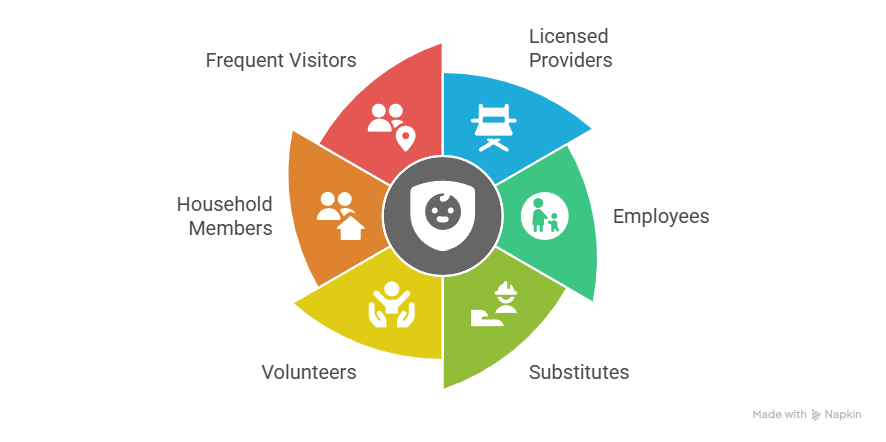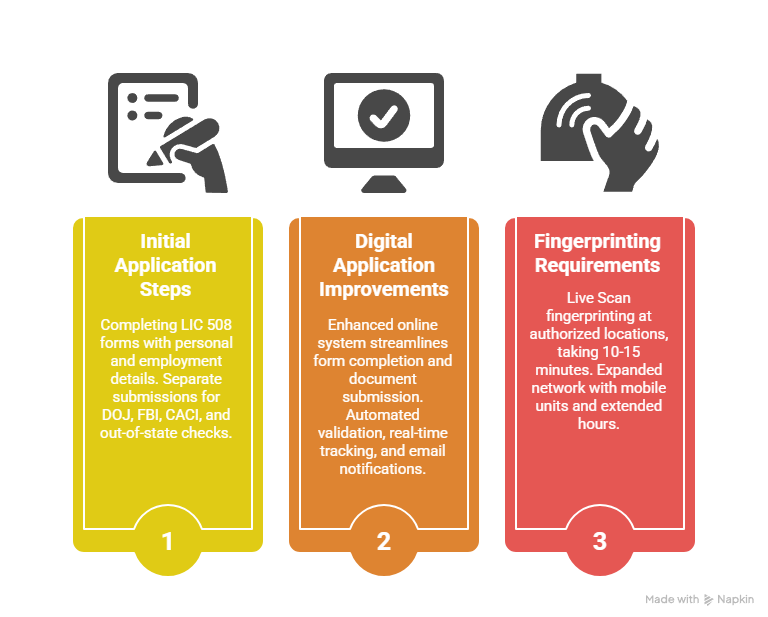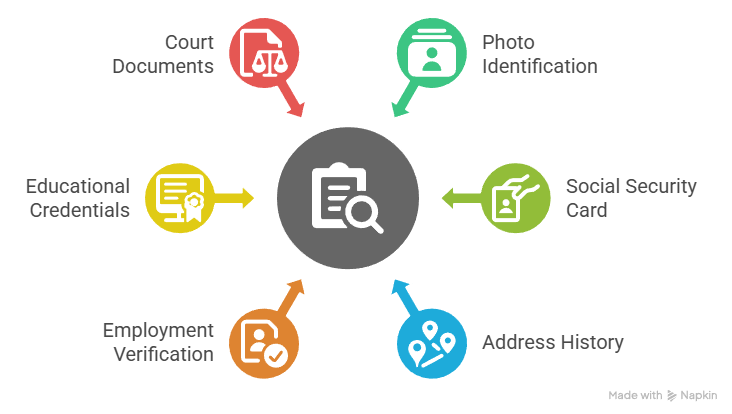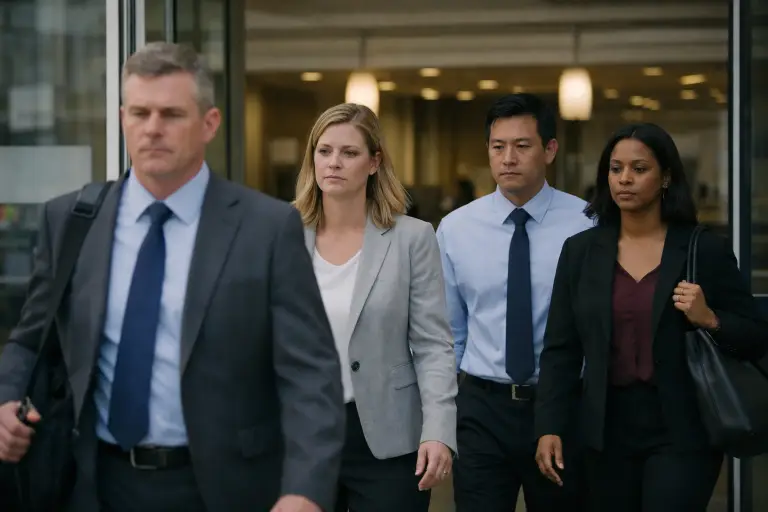California maintains the nation's most comprehensive childcare background check requirements. Moreover, these regulations mandate multiple state and federal screenings for anyone working with children under six years old. These rigorous screening processes protect vulnerable populations while ensuring qualified professionals can navigate the licensing system effectively.
Key Takeaways
- California requires both DOJ Live Scan fingerprinting and FBI background checks for all childcare workers, including owners, employees, and volunteers over 18
- The Child Abuse Central Index (CACI) clearance is mandatory and screens for substantiated child abuse reports within California's database
- Background checks must be completed before an individual can work unsupervised with children, with temporary provisional status available during processing
- Disqualifying offenses include violent crimes, sexual offenses, child abuse, and drug-related convictions, though some may be eligible for exemption review
- Renewal requirements vary by license type, with family childcare providers renewing every five years and center-based programs following different schedules
- Processing times typically range from 2-8 weeks, depending on the complexity of an individual's history and current state processing volumes
Understanding California's Childcare Background Check System
California's childcare background check requirements represent one of the most thorough screening systems in the United States. The state mandates comprehensive criminal history reviews for anyone seeking to work in licensed childcare facilities. Furthermore, these requirements apply to family daycare homes, childcare centers, and other licensed programs serving children under six years old.
The California Department of Social Services (CDSS) oversees these background check processes through Community Care Licensing. Additionally, each screening component serves a specific purpose in protecting children while maintaining fair employment practices. The system balances public safety with rehabilitation opportunities for individuals with past convictions.
As of 2025, California has implemented enhanced digital processing systems to streamline background check procedures. These updates reduce processing delays while maintaining the same rigorous screening standards. Consequently, applicants can expect more consistent timelines and better communication throughout the review process.
The state's approach to childcare screening reflects evolving best practices in child protection. Recent policy updates emphasize trauma-informed care principles while strengthening safety protocols. Therefore, understanding these requirements becomes essential for anyone entering the childcare profession in California.
Who Must Complete Background Checks
Required Individuals and Positions
California law requires background checks for specific individuals associated with childcare operations. Licensed childcare providers, whether operating family daycare homes or center-based programs, must undergo complete screening processes. Similarly, all employees working directly with children need clearance before beginning unsupervised duties.
The following positions require mandatory background screening:

- Licensed providers: Primary operators of family childcare homes or center directors
- Employees: Teachers, aides, cooks, and administrative staff with child access
- Substitutes: Temporary workers providing childcare services during regular staff absences
- Volunteers: Individuals providing regular unpaid services with child contact opportunities
- Household members: Adults residing in family childcare home locations
- Frequent visitors: Individuals regularly present during childcare operating hours
Even transportation providers and maintenance workers with potential child contact must complete background screenings. Thus, the state takes a comprehensive approach to ensure all adults with access undergo proper vetting. This thorough system protects children from potential harm while creating accountability throughout the childcare environment.
Age Requirements and Exemptions
All individuals age 18 and older must complete background screening before working in licensed childcare facilities. However, some limited exemptions exist for specific circumstances and relationships. For instance, parents dropping off or picking up their own children do not require background checks for brief facility visits.
Similarly, one-time visitors attending special events or field trips may receive temporary supervision without screening requirements. Nevertheless, anyone providing regular services or having ongoing access to children must complete full background evaluations. These distinctions help facilities maintain safety while allowing normal family and community interactions.
Types of Background Checks Required
DOJ Live Scan Fingerprinting
The California Department of Justice (DOJ) Live Scan represents the primary state-level criminal background screening. This electronic fingerprinting system captures digital prints and searches state criminal databases immediately. Processing typically occurs within 72 hours for individuals without criminal histories.
Live Scan results include arrests, convictions, and court dispositions from California jurisdictions. Additionally, the system captures pending charges and outstanding warrants. Results remain valid for specific periods depending on the individual's role and license type.
Live Scan technology has improved significantly in 2025. New digital systems provide clearer fingerprint images and faster database searches. Consequently, processing times have decreased while accuracy has increased substantially.
FBI Federal Background Check
The Federal Bureau of Investigation screening captures nationwide criminal history information. This component identifies crimes committed outside California that might not appear in state databases. FBI processing times vary significantly based on current application volumes and individual history complexity.
The federal screening process requires separate fingerprint submission through authorized Live Scan locations. Results include convictions from all states, federal courts, and military tribunals. Furthermore, some older records may require additional verification time.
| Component | Processing Time | Validity Period | Cost Range |
| FBI Fingerprinting | 2-6 weeks | Varies by position | $17-28 |
| DOJ Live Scan | 72 hours - 2 weeks | 1-5 years | $35-52 |
Recent federal improvements have streamlined interstate information sharing. As a result, background check results now include more comprehensive data from participating jurisdictions. This enhanced cooperation helps identify potential risks more effectively across state boundaries.
Child Abuse Central Index (CACI) Clearance
The Child Abuse Central Index maintains records of substantiated child abuse reports within California. CACI clearance is mandatory for all childcare positions, regardless of other background check results. This database specifically targets individuals with documented histories of child maltreatment.
CACI searches require specific request forms submitted directly to the Department of Justice. Processing typically takes 2-3 weeks for standard applications. Moreover, individuals with CACI listings may petition for exemption reviews under specific circumstances, though approval rates remain low for childcare positions.
The CACI system underwent significant updates in 2025 to improve data accuracy and processing efficiency. New protocols ensure more timely updates and better cross-referencing with other state databases. Therefore, screening results provide more complete protection for children in care settings.
Out-of-State Background Checks
Individuals who have lived outside California within the past five years must complete additional background screenings. These out-of-state checks verify criminal history from previous residences and employment locations. Each state has different processing requirements and timelines for releasing information.
Some states provide immediate electronic responses, while others require manual record searches. Consequently, out-of-state background checks can significantly extend overall processing times. Applicants should plan accordingly when previous addresses span multiple jurisdictions.
The Application and Screening Process

Initial Application Steps
Childcare background check applications begin with completing LIC 508 forms through Community Care Licensing. Applicants must provide detailed personal information, employment history, and residence records for the past five years. Supporting documentation includes photo identification, Social Security verification, and educational credentials.
The application process requires separate submissions for each background check component:
- LIC 508A: DOJ Live Scan criminal background clearance request
- LIC 508B: FBI federal criminal history screening application
- LIC 508C: Child Abuse Central Index clearance request
- LIC 508D: Out-of-state background check requests (if applicable)
Complete applications must be submitted before individuals can begin working with children. Incomplete submissions result in processing delays and potential license violations for employers. Therefore, careful attention to detail during initial submission prevents costly delays.
Digital Application Improvements
California launched an enhanced online application system in 2025. This digital platform streamlines form completion and document submission processes. Additionally, applicants can track their application status in real-time through secure online portals.
The new system automatically validates information and flags incomplete sections before submission. This prevents common errors that previously caused processing delays. Furthermore, digital document upload capabilities reduce mail delays and improve security.
Automated email notifications keep applicants informed throughout the review process. These updates include receipt confirmations, processing milestones, and completion notices. Consequently, applicants have better visibility into their application status and expected completion dates.
Fingerprinting Requirements and Locations
Live Scan fingerprinting occurs at authorized locations throughout California. These include police departments, private fingerprinting services, and some community colleges. Appointments are often required, especially in metropolitan areas. Individuals must bring valid photo identification and exact payment amounts.
The fingerprinting process typically takes 10-15 minutes per person. Technicians capture all ten fingerprints electronically and submit them immediately to state and federal databases. Poor print quality may require multiple attempts or alternate submission methods.
In 2025, California expanded its network of authorized fingerprinting locations. New mobile fingerprinting units serve rural areas with limited access to traditional facilities. Additionally, extended hours and weekend availability accommodate working professionals' scheduling needs.
Disqualifying Offenses and Exemption Processes
California maintains specific lists of crimes that automatically disqualify individuals from childcare work. These offenses are categorized into permanent bars and reviewable convictions. The severity and recency of crimes influence eligibility determinations significantly.
Permanent disqualifying offenses include violent felonies, sexual crimes involving minors, and serious drug trafficking convictions. Lesser offenses may qualify for exemption review after specific waiting periods. The state considers rehabilitation evidence, employment history, and character references during exemption evaluations.
Recent legislative updates in 2025 refined the disqualification criteria to reflect current criminal justice research. Some non-violent offenses now have shorter waiting periods before exemption review eligibility. However, crimes against children maintain strict permanent disqualification status.
Automatic Disqualifications
Individuals with automatic disqualifications cannot work in licensed childcare facilities under any circumstances. These restrictions apply regardless of rehabilitation efforts or time elapsed since conviction. The state prioritizes child safety over employment opportunities in these cases.
| Offense Category | Permanent Bar | Review Eligible | Waiting Period |
| Violent Felonies | Yes | No | N/A |
| Sex Crimes | Yes | Limited | N/A |
| Child Abuse | Yes | Very Limited | 10+ years |
| Drug Felonies | No | Yes | 5-10 years |
| Property Crimes | No | Yes | 3-7 years |
| DUI Convictions | No | Yes | 3-5 years |
The automatic disqualification list includes specific statutory violations that directly threaten child safety. Recent updates clarified ambiguous offense categories and added new crimes reflecting modern criminal codes. Therefore, applicants can better understand their eligibility status before beginning the application process.
Exemption Review Process
The exemption review process allows individuals with certain criminal histories to petition for childcare employment eligibility. Applicants must demonstrate rehabilitation, stable employment, and community support. The review considers crime circumstances, victim impact, and public safety risks.
Exemption applications require extensive documentation including court records, probation reports, employment verification, and character references. Community Care Licensing conducts thorough investigations before making determinations. Approval rates vary significantly based on offense types and individual circumstances.
The exemption process typically takes 6-12 months for complete review. Applicants may continue other employment during processing but cannot work in childcare settings. Denied exemption requests may be appealed through administrative hearing processes.
In 2025, California implemented new exemption review guidelines emphasizing restorative justice principles. The updated process considers community impact, victim perspectives, and rehabilitation evidence more comprehensively. Additionally, successful applicants receive ongoing monitoring to ensure continued compliance.
Processing Times and Costs
Timeline Expectations
Standard background check processing varies depending on individual criminal history complexity and current state processing volumes. Clean backgrounds typically clear within 2-4 weeks for all required components. Individuals with criminal histories may experience significantly longer delays due to additional verification requirements.
Processing bottlenecks often occur during peak application periods, particularly before school year starts and during summer months. Community Care Licensing recommends submitting applications 8-12 weeks before intended employment start dates. Rush processing is not available for childcare background checks.
Current processing times by component:
- DOJ Live Scan: 3-7 business days for clean records
- FBI Federal: 2-6 weeks depending on history complexity
- CACI Clearance: 2-3 weeks for standard processing
- Out-of-state checks: 3-10 weeks depending on state cooperation
2025 processing improvements have reduced average completion times by approximately 20%. Enhanced digital systems and interstate cooperation contribute to these efficiency gains. However, complex cases still require additional time for thorough review and verification.
Fee Structure and Payment Methods
California childcare background checks involve multiple fees paid to different agencies. DOJ Live Scan fees are set by state regulation and collected by fingerprinting locations. FBI fees are federal charges that cannot be waived or reduced.
Live Scan locations may charge additional service fees for fingerprinting services. These fees vary by provider but typically range from $12-28 per session. Some locations offer package deals for multiple family members applying simultaneously.
Payment methods vary by location, with most accepting cash, money orders, and credit cards. Personal checks are generally not accepted due to processing delays. Applicants should verify payment options before scheduling appointments to avoid delays.
The 2025 fee schedule reflects inflation adjustments and enhanced processing capabilities. While costs have increased modestly, improved efficiency provides better value through faster processing and digital conveniences. Additionally, some counties offer fee assistance programs for low-income applicants.
Cost-Saving Strategies
Several strategies can help minimize background check expenses for childcare workers and employers. Group applications may qualify for volume discounts at some fingerprinting locations. Additionally, completing all required components simultaneously prevents duplicate fingerprinting fees.
Employers may choose to reimburse background check costs as part of recruitment packages. This approach attracts qualified candidates while ensuring compliance requirements are met promptly. Furthermore, some training programs include background check assistance in their certification packages.
Planning ahead prevents rush fees and emergency processing charges. Early application submission allows time for corrections without expensive expedited services. Therefore, strategic timing reduces both costs and stress for applicants and employers.
Common Application Challenges and Solutions
Documentation Requirements
Complete documentation is essential for successful background check processing. Missing or incorrect information causes significant delays and potential application rejections. Applicants must gather comprehensive records before beginning the submission process.
Required documentation includes:

- Valid photo identification: Driver's license, state ID, or passport
- Social Security card: Original or certified copy required
- Address history: Complete five-year residence record with dates
- Employment verification: Previous childcare positions and references
- Educational credentials: Relevant training certificates or degrees
- Court documents: Complete records for any criminal history
Incomplete applications return to applicants for additional information, restarting processing timelines. Therefore, thorough preparation prevents costly delays and ensures smooth application processing.
Addressing Criminal History
Applicants with criminal histories should prepare comprehensive documentation explaining their circumstances. Court records, probation reports, and rehabilitation evidence support exemption review applications. Honesty and transparency throughout the process improve approval chances significantly.
Character references from employers, community leaders, and treatment providers demonstrate rehabilitation commitment. Additionally, evidence of stable employment, education completion, and community service strengthens exemption petitions. The state values genuine efforts toward positive life changes.
Legal assistance may benefit applicants with complex criminal histories. Attorneys specializing in administrative law can guide exemption applications and appeals processes. However, legal representation does not guarantee approval but may improve application quality and presentation.
Employer Responsibilities and Best Practices
California childcare employers bear significant responsibility for maintaining compliant background check programs. Licensed facilities must verify all required personnel complete appropriate screening before working with children. Additionally, employers must maintain current documentation and monitor renewal requirements.
Best practices include establishing clear policies, maintaining organized records, and providing staff training on compliance requirements. Regular audits ensure ongoing compliance and identify potential issues before they become violations. Furthermore, proactive management prevents operational disruptions and protects children effectively.
Staff Onboarding Procedures
Effective onboarding procedures ensure new employees complete background checks before beginning unsupervised duties. Clear communication about requirements and timelines prevents confusion and compliance violations. Additionally, provisional employment policies allow supervised training while screening processes complete.
New employee checklists should include:
- Application submission: All required forms completed accurately
- Fingerprinting appointment: Scheduled within one week of hire
- Documentation review: Personnel files contain all required clearances
- Provisional supervision: Direct oversight until clearance completion
- Training requirements: Compliance education and facility policies
Systematic onboarding processes reduce errors and ensure consistent compliance across all staff positions. Therefore, well-designed procedures protect both children and employers from potential risks.
Record Keeping and Compliance Monitoring
Employers must maintain comprehensive records of all staff background clearances. These files should include original clearance letters, renewal dates, and any exemption documentation. Regular audits verify all personnel maintain current clearances throughout their employment.
Digital record systems provide secure storage and automated renewal reminders. Cloud-based platforms ensure backup protection and easy retrieval during licensing inspections. Additionally, automated alerts prevent lapses that could result in compliance violations.
Annual compliance reviews verify all staff maintain required clearances and identify upcoming renewal requirements. These systematic evaluations prevent oversight and ensure continuous regulatory compliance. Furthermore, documented reviews demonstrate due diligence during licensing inspections.
Maintaining Compliance and Renewals
California requires ongoing compliance monitoring for all licensed childcare providers and their staff. Background check renewals occur on specific schedules depending on license type and individual roles. Family childcare providers must renew every five years, while center-based programs follow different timelines.
Compliance monitoring includes random audits, complaint investigations, and renewal inspections. Licensing representatives may request updated background information during routine visits. Providers must maintain current clearance documentation for all required individuals throughout their licensing period.
The 2025 compliance framework emphasizes proactive monitoring and self-reporting requirements. New digital systems enable real-time compliance tracking and automated renewal notifications. Consequently, providers have better tools for maintaining ongoing compliance and avoiding violations.
Renewal Requirements by License Type
Different childcare license types have varying renewal requirements and schedules. Family childcare homes operate on five-year cycles with comprehensive background updates required. Childcare centers may have annual or biennial renewal requirements depending on capacity and services provided.
Staff turnover requires immediate background screening for new employees before they can work unsupervised with children. Temporary employees and substitutes must complete abbreviated screening processes. Long-term substitutes require full background clearances identical to permanent staff.
Renewal documentation must be submitted 60-90 days before expiration dates to ensure continuous operation authorization. Late renewals may result in license suspension and operational restrictions. Providers should maintain renewal calendars to track multiple staff clearance expiration dates.
The updated 2025 renewal process includes enhanced digital submission options and automated status tracking. Online portals provide renewal reminders and streamlined documentation upload capabilities. Therefore, maintaining compliance becomes more manageable for busy childcare providers.
Consequences of Non-Compliance
Failure to maintain current background clearances results in serious regulatory consequences. Licensing violations may include fines, operational restrictions, or complete license revocation. Additionally, operating without proper clearances exposes providers to liability risks and insurance complications.
Common compliance violations include:
- Expired clearances: Staff working beyond clearance expiration dates
- Incomplete screening: Missing required background check components
- Inadequate supervision: Uncleared individuals working unsupervised with children
- Poor record keeping: Missing or incomplete clearance documentation
- Delayed applications: Failing to submit renewal applications timely
Serious violations may result in immediate facility closure and criminal referrals for child endangerment. Therefore, maintaining rigorous compliance programs protects both children and business operations from significant risks.
Resources and Support for Applicants
California provides numerous resources to help individuals navigate the childcare background check process successfully. Community Care Licensing offers detailed guidance documents, online tutorials, and telephone support services. Additionally, many community organizations provide application assistance and preparation services.
Professional associations and training programs often include background check guidance in their certification courses. These resources help new childcare workers understand requirements and prepare appropriate documentation. Furthermore, experienced providers frequently mentor newcomers through the application process.
Application Assistance Programs
Several organizations throughout California offer free or low-cost background check application assistance. These programs help individuals complete forms accurately, gather required documentation, and understand eligibility requirements. Additionally, some programs provide financial assistance for application fees.
Community college childcare programs often include application support as part of their career services. Students receive guidance on background check requirements and assistance with documentation preparation. Similarly, workforce development agencies provide support for individuals transitioning into childcare careers.
Legal aid organizations may assist individuals with complex criminal histories navigate exemption review processes. These services help prepare comprehensive applications and represent applicants during appeals proceedings. However, availability varies by location and individual circumstances.
Conclusion
California's comprehensive childcare background check system protects vulnerable children while providing clear pathways for qualified individuals to enter the profession. Understanding these requirements helps both employers and job seekers navigate the complex regulatory landscape effectively in 2025. Success requires early planning, complete documentation, and ongoing compliance monitoring throughout the licensing period. The investment in thorough background screening ultimately creates safer environments for children and stronger professional standards for the childcare industry.
Frequently Asked Questions
How long do California childcare background checks take to complete in 2025?
Standard processing takes 2-6 weeks depending on individual criminal history and current state processing volumes. Clean backgrounds typically clear within 2-4 weeks, while complex histories may require additional verification time. Submit applications 8-12 weeks before intended start dates to ensure timely completion.
Can I work in childcare while my background check is processing?
No, California prohibits unsupervised childcare work before background clearance completion. However, some facilities may allow supervised training or administrative duties during processing. Provisional employment requires direct supervision at all times when children are present.
What crimes permanently disqualify someone from childcare work in California?
Violent felonies, sexual offenses, serious child abuse convictions, and certain drug trafficking crimes create permanent employment bars. These restrictions cannot be waived through exemption processes. Lesser offenses may qualify for review after specific waiting periods with demonstrated rehabilitation.
How much do California childcare background checks cost in 2025?
Total costs range from $85-165 depending on required components and service providers. DOJ Live Scan fees are approximately $35-52, FBI processing costs $17-28, and fingerprinting services charge $12-28. Additional fees may apply for out-of-state screenings.
Do background checks need to be renewed for childcare workers?
Yes, renewal requirements vary by license type and individual roles. Family childcare providers renew every five years, while center staff may have different schedules. New employees always require complete background screening regardless of previous clearances from other positions.
Can someone with a criminal record work in California childcare?
Limited opportunities exist through the exemption review process for certain non-violent offenses. Applicants must demonstrate rehabilitation and meet specific waiting periods. Violent crimes and sexual offenses create permanent employment bars that cannot be overturned through any process.
Additional Resources
- California Department of Social Services Community Care Licensing Division
https://www.cdss.ca.gov/inforesources/community-care-licensing - DOJ Live Scan Fingerprinting Location Directory
https://oag.ca.gov/fingerprints/locations - LIC 508 Background Check Forms and Instructions
https://www.cdss.ca.gov/cdssweb/entres/forms/English/LIC508.pdf - Child Abuse Central Index Information and Procedures
https://oag.ca.gov/childabuse/caci - California Code of Regulations Title 22 Childcare Licensing
https://govt.westlaw.com/calregs/Browse/Home/California/CaliforniaCodeofRegulations - Background Check Exemption Review Process Guidelines
https://www.cdss.ca.gov/lettersnotices/entres/getinfo/acl/2025/ACL-25-01.pdf

GCheck Editorial Team
Meet the GCheck Editorial Team, your trusted source for insightful and up-to-date information in the world of employment background checks. Committed to delivering the latest trends, best practices, and industry insights, our team is dedicated to keeping you informed.
With a passion for ensuring accuracy, compliance, and efficiency in background screening, we are your go-to experts in the field. Stay tuned for our comprehensive articles, guides, and analysis, designed to empower businesses and individuals with the knowledge they need to make informed decisions.
At GCheck, we're here to guide you through the complexities of background checks, every step of the way.





